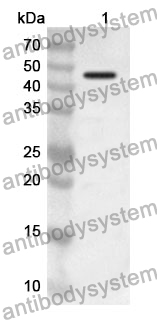Catalog No.
PHE01001
Species reactivity
Human, Mouse, Rat
Host species
Rabbit
Isotype
IgG
Clonality
Polyclonal
Immunogen
E. coli - derived recombinant Human HPD (Thr2-Met393).
Tested applications
ELISA: 1:4000-1:8000, IHC: 1:50-1:100, WB: 1:1000-1:4000
Target
4-hydroxyphenylpyruvate dioxygenase,HPPDase,PPD,4HPPD,HPD,4-hydroxyphenylpyruvic acid oxidase
Purification
Purified by antigen affinity column.
Accession
P32754
Applications
ELISA, IHC, WB
Form
Liquid
Storage buffer
0.01M PBS, pH 7.4, 50% Glycerol, 0.05% Proclin 300.
Stability and Storage
Use a manual defrost freezer and avoid repeated freeze thaw cycles. Store at 2 to 8°C for frequent use. Store at -20 to -80°C for twelve months from the date of receipt.
Myomedin variants developed for in vitro PD-L1 diagnostics in tissue samples of non-small cell lung carcinoma patients., PMID:40514707
Case Report: Exploring delayed hyperprogressive disease: a case study of post-immunotherapy in lung cancer., PMID:40313962
Cut-off evaluation of ID Screen Mycoplasma bovis ELISA for use on bulk tank milk in New Zealand., PMID:40267863
CD47 peptide-cloaked lipid nanoparticles promote cell-specific mRNA delivery., PMID:40087866
Evaluation of hyperprogressive disease with atezolizumab plus bevacizumab for hepatocellular carcinoma: A secondary analysis of the IMbrave150 trial., PMID:40079683
Hyperprogressive disease induced by PD-1 inhibitor monotherapy in lung adenocarcinoma with HER2 exon 20 insertion: report of two cases and review of literature., PMID:39760792
Discovery and preclinical evaluation of BPB-101: a novel triple functional bispecific antibody targeting GARP-TGF-β complex/SLC, free TGF-β and PD-L1., PMID:39635528
Exploring the Frequency and Risk Factors of Hyperprogressive Disease in Patients with Advanced Melanoma Treated with Immune Checkpoint Inhibitors., PMID:39451776
First reported advanced pancreatic cancer with hyperprogression treated with PD-1 blockade combined with chemotherapy: a case report and literature review., PMID:39404967
Design, synthesis, and antitumor activity evaluation of 1,2,3-triazole derivatives as potent PD-1/PD-L1 inhibitors., PMID:39278065
Genetic characteristics of human parainfluenza viruses 1-4 associated with acute lower respiratory tract infection in Chinese children, during 2015-2021., PMID:39264196
Mucosal adenovirus vaccine boosting elicits IgA and durably prevents XBB.1.16 infection in nonhuman primates., PMID:39227514
Comprehensive Glycomic and Glycoproteomic Analyses of Human Programmed Cell Death Protein 1 Extracellular Domain., PMID:39101792
GNUV201, a novel human/mouse cross-reactive and low pH-selective anti-PD-1 monoclonal antibody for cancer immunotherapy., PMID:38730320
Engineering PD-1-targeted small protein variants for in vitro diagnostics and in vivo PET imaging., PMID:38711085
Polymer-based antibody mimetics (iBodies) target human PD-L1 and function as a potent immune checkpoint blocker., PMID:38685532
Preclinical imaging evaluation of a bispecific antibody targeting hPD1/CTLA4 using humanized mice., PMID:38677243
Design, Synthesis, and Evaluation of 8-(o-Tolyl)quinazoline Derivatives as Small-Molecule PD-1/PD-L1 Antagonists., PMID:38628793
Genome and evolution of Tibet orbivirus, TIBOV (genus Orbivirus, family Reoviridae)., PMID:38505291
Detection limitations of prion seeding activities in blood samples from patients with sporadic prion disease., PMID:38468258
Targeting lipid nanoparticles to the blood-brain barrier to ameliorate acute ischemic stroke., PMID:38454606
Noninvasive Evaluation of Tumoral PD-L1 Using a Novel 99mTc-Labeled Nanobody Tracer with Rapid Renal Clearance., PMID:38395797
Small molecule and PROTAC molecule experiments in vitro and in vivo, focusing on mouse PD-L1 and human PD-L1 differences as targets., PMID:38350367
Exploration of genetic characterization in hyperprogressive disease after immunotherapy retreatment in a patient with LCNEC: A case report., PMID:38348622
Incidence of Hyper Progressive Disease in Combination Immunotherapy and Anti-Programmed Cell Death Protein 1/Programmed Death-Ligand 1 Monotherapy for Unresectable Hepatocellular Carcinoma., PMID:38344443
Identification and assessment of the 1,6-dihydroxy-pyridin-2-one moiety as privileged scaffold for HBV ribonuclease H inhibition., PMID:38325606
Uncovering the colorectal cancer immunotherapeutic potential: Evening primrose (Oenothera biennis) root extract and its active compound oenothein B targeting the PD-1/PD-L1 blockade., PMID:38266440
Multifunctional Probe Based on "Chemical Antibody-Aptamer" for Noninvasive Detection of PD-L1 Expression in Cancer., PMID:38093483
Development of anti-PD-L1 antibody based on structure prediction of AlphaFold2., PMID:37942332
The upregulation of immune checkpoints after photodynamic therapy reducing immune effect for treating breast cancer., PMID:37882915
Development of novel peptide-based radiotracers for detecting PD-L1 expression and guiding cancer immunotherapy., PMID:37878029
Develop a PD-1-blockade peptide to reinvigorate T-cell activity and inhibit tumor progress., PMID:37866745
Hyperprogressive disease in lung metastases without target lesion progression after durvalumab consolidation therapy: A case report., PMID:37699791
Hyperprogression in advanced melanoma is not restricted to immunotherapy., PMID:37690179
Development of polyclonal heavy chain antibodies targeting programmed death ligand-1., PMID:37383651
Evaluation of therapeutic PD-1 antibodies by an advanced single-molecule imaging system detecting human PD-1 microclusters., PMID:37280233
Soluble monomeric human programmed cell death-ligand 1 inhibits the functions of activated T cells., PMID:37266424
Tumor microenvironmental modification by the current target therapy for head and neck squamous cell carcinoma., PMID:37143088
Therapeutic efficacy of plant-produced Nivolumab in transgenic C57BL/6-hPD-1 mouse implanted with MC38 colon cancer., PMID:37064962
Hyperprogressive disease during atezolizumab plus bevacizumab treatment in patients with advanced hepatocellular carcinoma from Japanese real-world practice., PMID:37003980
A Potential Off-Target Effect of the Wnt/β-Catenin Inhibitor KYA1797K: PD-L1 Binding and Checkpoint Inhibition., PMID:36938364
Glycan-Controlled Human PD-1 Variants Displaying Broad-Spectrum High Binding to PD-1 Ligands Potentiate T Cell., PMID:36897183
Advances in the Study of Hyperprogression of Different Tumors Treated with PD-1/PD-L1 Antibody and the Mechanisms of Its Occurrence., PMID:36831655
Regulating the Obesity-Related Tumor Microenvironment to Improve Cancer Immunotherapy., PMID:36809912
Paradoxical cancer cell stimulation by IFNγ drives tumor hyperprogression upon checkpoint blockade immunotherapy., PMID:36787694
The establishment of B cell-deficient Igh-J KO mouse model by gene editing and efficacy evaluation., PMID:36689847
Impact of response patterns for patients with advanced acral melanoma treated with anti-programmed death-1 monotherapy., PMID:36689499
Synergistic effect of glutathione and IgG4 in immune evasion and the implication for cancer immunotherapy., PMID:36681047
Development of a radiolabeled site-specific single-domain antibody positron emission tomography probe for monitoring PD-L1 expression in cancer., PMID:36605578
Bayesian Molecular Dating Analyses Combined with Mutational Profiling Suggest an Independent Origin and Evolution of SARS-CoV-2 Omicron BA.1 and BA.2 Sub-Lineages., PMID:36560768

